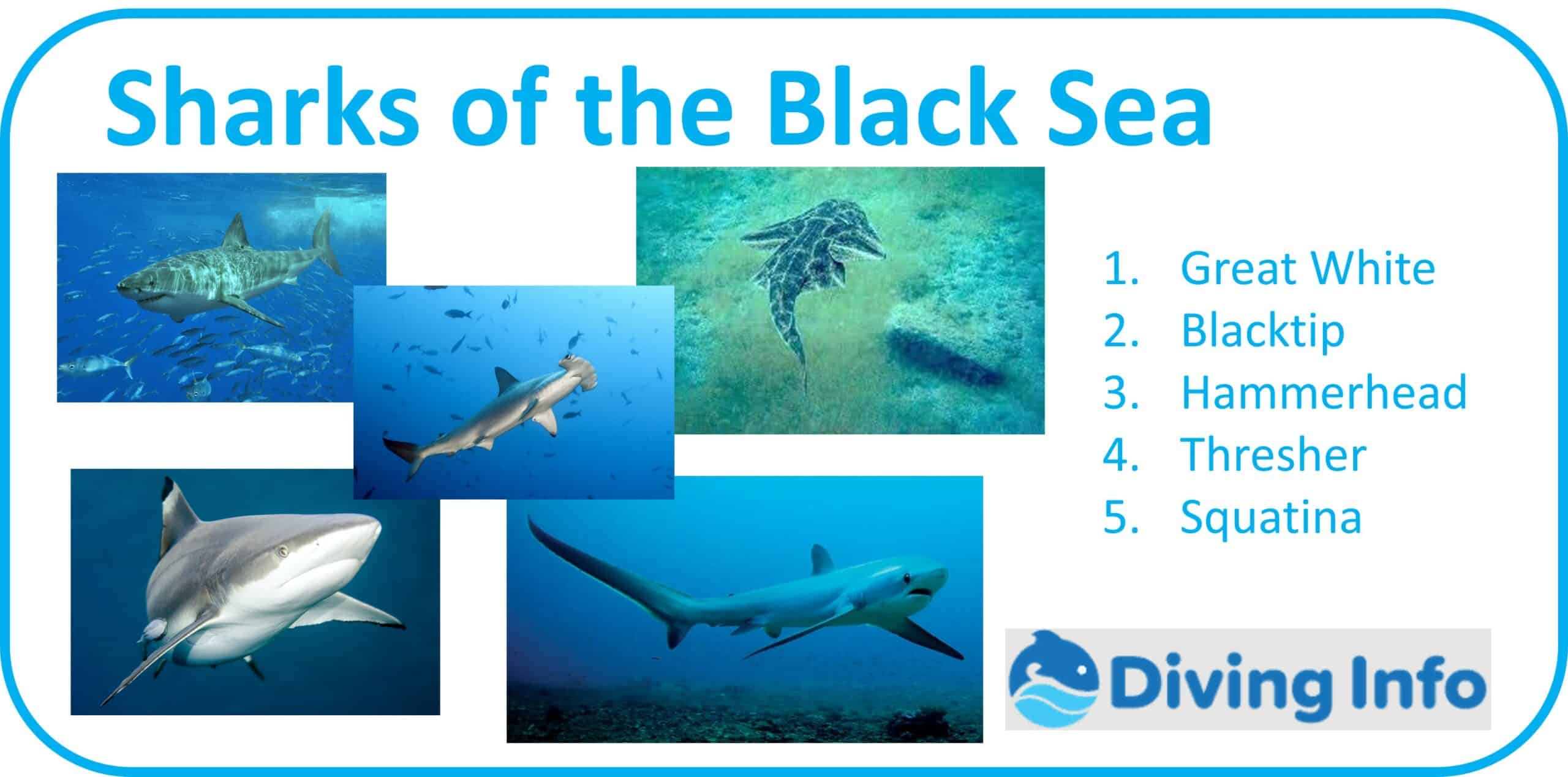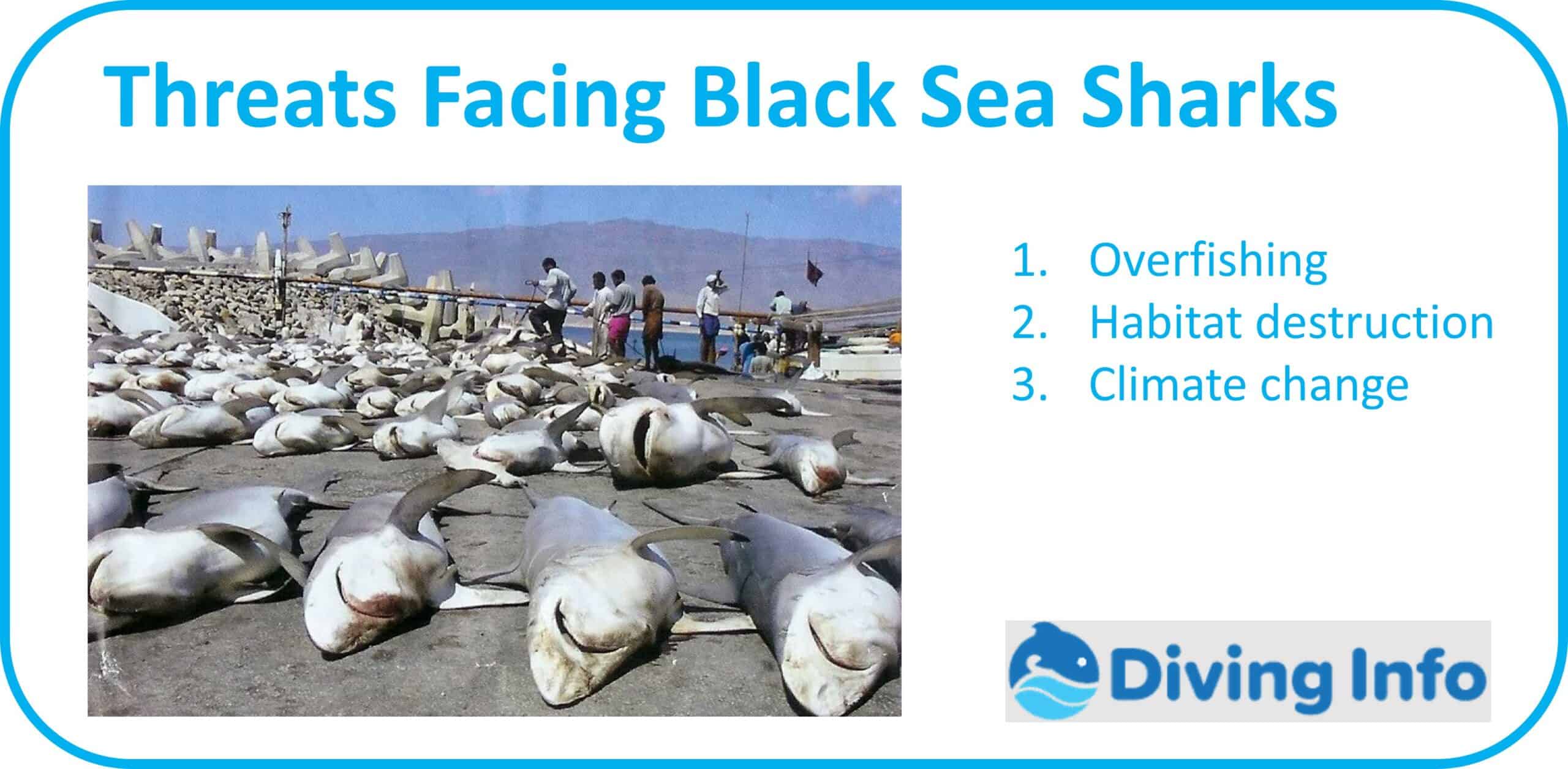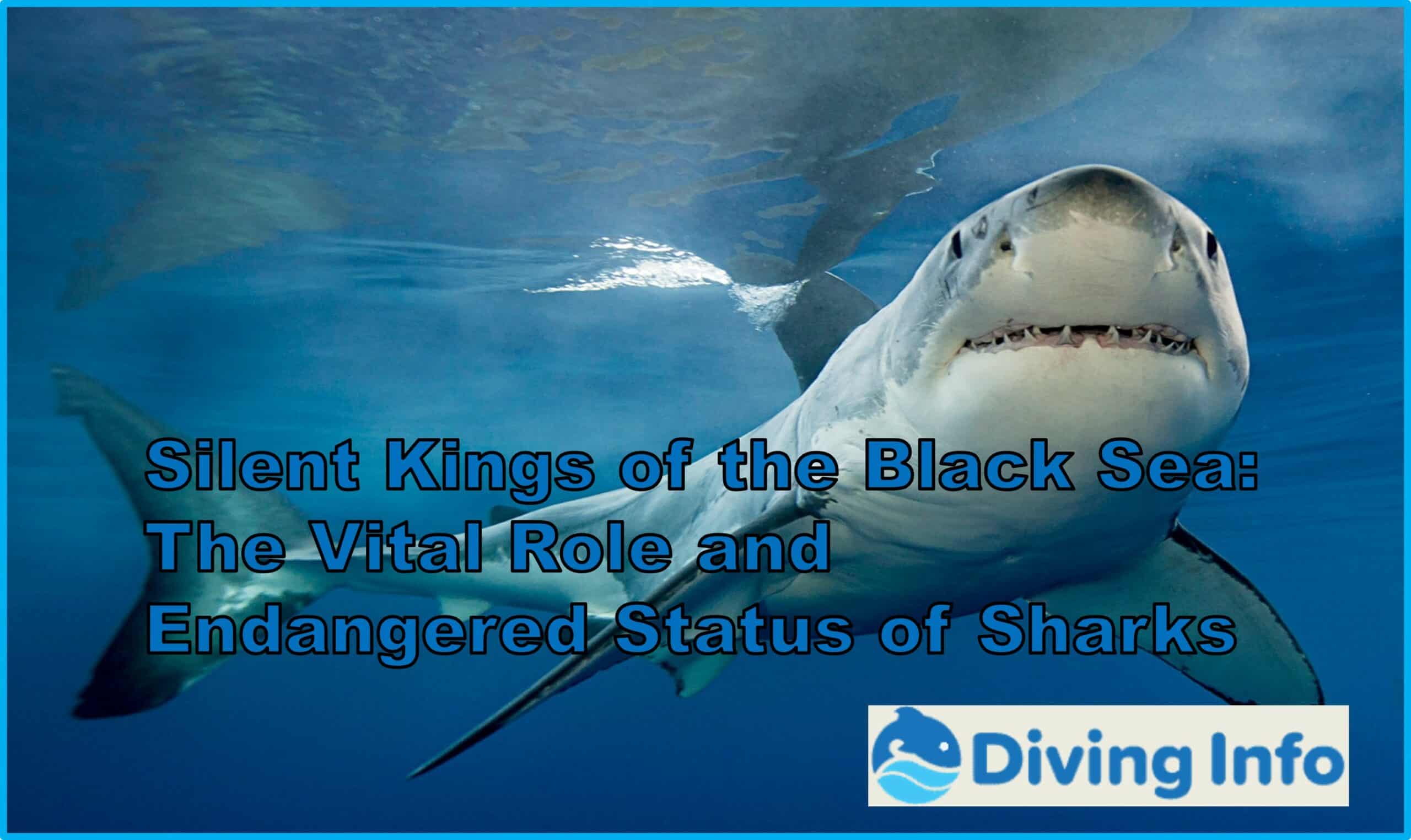*This post may contain affiliate links. As an Amazon Associate we earn from qualifying purchases.
The Mysterious Black Sea and Its Predators
The Black Sea, located between Europe and Asia, is a unique body of water that has captured the imagination of humans for centuries. With its dark waters and rich history, this sea is home to many species of marine life, including sharks. Despite its name, the Black Sea is not actually black.
Instead, it is a deep blue color due to its high salt content and lack of mixing with other seas. The unique ecosystem in this sea has evolved over thousands of years, resulting in many endemic species that are found nowhere else on earth.
One such group of animals that call the Black Sea home are sharks. While their populations may not be as diverse or plentiful as those found in other oceans around the world, these predators still play an important role in the ecosystem here.
Sharks are apex predators that help to keep other marine life populations in check. Without them, certain fish species would overpopulate and disrupt the delicate balance of the ecosystem.
Additionally, sharks help to keep ocean habitats healthy by preying on sick or weak individuals, preventing disease from spreading throughout populations. Despite their importance to the ecosystem, many shark populations around the world have been declining due to overfishing and habitat destruction.
In fact, some species have experienced declines of up to 90%. It’s important that we protect these vital predators so they can continue fulfilling their crucial role in our oceans for generations to come.
Types of Sharks in the Black Sea
Common species found in the region (e.g. blue shark, smooth hammerhead)
The Black Sea is home to a diverse array of shark species, each with unique characteristics and behaviors. Some of the most common species found in this region include the blue shark and smooth hammerhead.
The Blue Shark (Prionace glauca) is one of the most recognizable sharks in the world due to its distinctive coloration. These sharks are typically 8-10 feet long and can weigh up to 400 pounds.
Blue sharks are known for their slender bodies and long, pointed snouts that help them navigate through the water with ease. They are also known for their incredible swimming ability, as they can reach speeds of up to 43 miles per hour.
Another common species found in the Black Sea is the Smooth Hammerhead (Sphyrna zygaena). These sharks are named for their unique head shape – a flattened extension on either side of their heads that allows them to see above and below them at all times.
Smooth Hammerheads can grow up to 14 feet long and weigh over 1,000 pounds. They are fast swimmers and often travel in large schools.
Unique characteristics and behaviors of each species
Each species of shark in the Black Sea has its own set of unique characteristics that make it well adapted to its environment. For example, Blue Sharks have highly sensitive eyesight that allows them to spot prey from great distances even in low light conditions.
They also have specially adapted teeth that allow them to grip onto slippery prey like squid or fish. Smooth Hammerheads have a special sense organ called an ampullae or Lorenzini which allows them to detect small electrical fields produced by other animals nearby – including those produced by their potential prey or predators.
Despite their differences, all shark species in the Black Sea share one thing in common: they play a vital role in the ecosystem as top predators. By controlling populations of smaller fish and marine animals, sharks help maintain a healthy balance within the ecosystem.
The Dire Threats Facing Black Sea Sharks
Overfishing and Bycatch
One of the biggest threats to shark populations in the Black Sea is overfishing. Sharks are not only caught intentionally for their fins and meat, but they are also frequently caught as bycatch in other types of fishing gear. This means that many sharks die needlessly, often because fishermen do not know how to safely release them back into the water.
The practice of shark finning is particularly devastating, as it involves catching a shark, removing its fins while still alive, and then throwing the rest of the body back into the water to die. This practice has decimated shark populations around the world, and it is a threat that Black Sea sharks also face.
Habitat Destruction and Pollution
Another major threat to sharks in the Black Sea is habitat destruction. The Black Sea ecosystem has been heavily impacted by human activity over several decades.
Coastal development, oil drilling operations, dams on rivers that feed into the sea have all contributed to changes in water quality which have negatively impacted marine life. Pollution from agricultural runoff and sewage discharges into rivers that flow into the sea has led to an increase of toxins in fish tissue which ultimately impacts predators like sharks who rely on those prey species for food.
Climate Change
Climate change is yet another significant threat facing black sea sharks as it causes shifts in temperature patterns causing larger issues with food availability. Rising temperatures lead to changes in ocean currents resulting in less nutrients being available for marine life which can negatively impact black sea sharks’ ability to survive and thrive. Furthermore warming waters can impact spawning habits for species such as blue shark who have longer gestation periods meaning they may produce fewer young.
Ocean acidification also poses serious risks since it makes conditions too acidic for shellfish and coral reefs creating a cascading effect on the entire food chain. The combination of these threats poses a dire situation for sharks in the Black Sea, and action must be taken to protect them before it’s too late.
Conservation Efforts for Sharks in the Black Sea
International Agreements and Regulations on Shark Fishing
Shark fishing has been a major issue worldwide with many species being overfished for their meat, fins, and other valuable parts. The Black Sea is no exception, and the population of some shark species has significantly decreased over the years due to excessive fishing. However, there have been several international agreements and regulations put in place to protect these vulnerable animals.
One such agreement is the Convention on International Trade in Endangered Species (CITES) which regulates international shark trade. CITES lists several shark species as endangered or threatened, which means they cannot be traded without a permit.
The European Union has also established regulations to protect sharks in its waters. In 2019, they banned all commercial fishing for shortfin mako sharks.
Check out this very informative video about shark conservation.
Local Conservation Initiatives
Apart from international regulations, local conservation initiatives have also been put into place to help protect sharks in the Black Sea. Many local organizations are working tirelessly to raise awareness about the importance of these predators among fishermen and tourists who visit the region.
One such organization is “Black Sea Eco Academy” which aims to educate people about marine conservation issues through various programs including workshops and lectures. They also organize beach clean-ups and underwater surveys in order to monitor fish populations including sharks.
Another organization making a difference is “Dolphin Watch Alliance” which focuses on protecting dolphins but also recognizes that sharks play an important role in maintaining healthy ecosystem of Black Sea. They advocate against illegal fishing practices that harm both dolphins and sharks.
Research Efforts to Better Understand Shark Populations
In addition to local initiatives and international agreements, research efforts are being made towards better understanding shark populations in the Black Sea region through various studies conducted by scientists from different countries. For example, a study conducted by the Institute of Oceanology in Bulgaria found high levels of mercury in certain shark species such as blue sharks, which could have negative effects on their health and the rest of the marine ecosystem. Another study carried out by Turkish scientists found that sharks in the Black Sea have a unique genetic makeup compared to other sharks around the world.
This information can be used to better protect these populations and understand how they are adapting to changing conditions. Overall, these conservation efforts are crucial in protecting not only sharks but also maintaining a healthy and thriving marine ecosystem in the Black Sea for generations to come.
The Role of Sharks in the Black Sea Ecosystem
Importance as Apex Predators
Sharks are apex predators, which means they sit at the top of the food chain. They play a crucial role in regulating marine ecosystems by keeping other species in check. In the Black Sea, sharks are no exception.
Their position as apex predators gives them an important role in controlling prey populations and preventing overgrazing, which can lead to a collapse of the ecosystem. One interesting example is the impact of sharks on rays and skates, which are abundant in the Black Sea.
Sharks predate on these animals, but they also modify their behavior through intimidation. This can have a cascading effect throughout the food web, as these animals play important roles in regulating smaller organisms like plankton and detritus.
Influence on Other Marine Species
In addition to their direct impact through predation and behavior modification, sharks also exert an indirect influence on other marine species. For example, their presence can create habitats such as coral reefs that support other organisms like snails and crustaceans.
Sharks also provide benefits to humans indirectly by supporting fisheries through their role as predators that control populations of fish that compete with commercial species or prey on them directly. Therefore, preserving shark populations is not only important for protecting ecosystem health but also for maintaining fisheries.
Sharks also serve as indicators for ocean health conditions because they require healthy ecosystems to survive and reproduce successfully. When shark populations decline or become threatened it may signal wider problems within marine ecosystems that need attention.
Conclusion: Protecting Sharks Protects Ecosystems
Overall, preserving shark populations is essential to maintaining healthy marine ecosystems around the world including those found in the unique ecosystem of The Black Sea region. Through predation and behavior modification alone they play a crucial role in controlling prey populations and preventing overgrazing, which can lead to a collapse of the ecosystem. Additionally, they provide indirect benefits to other species and humans such as supporting fisheries.
Their status as indicator species highlights wider problems within marine ecosystems that need attention. It is important that we continue to protect sharks so that they can continue to serve these important functions in our oceans.
Myths and Misconceptions about Sharks in the Black Sea
The “Man-Eater” Stereotype
One of the most pervasive myths about sharks is that they are bloodthirsty man-eaters, lurking in the water to attack unsuspecting swimmers. While it is true that some sharks have been known to attack humans, these incidents are extremely rare, and sharks do not actively seek out human prey.
In fact, many shark species are quite docile and pose no threat to humans whatsoever. In the Black Sea specifically, there have been very few reported shark attacks on humans.
This is likely due to a combination of factors, including lower human population density along the coast and less frequent interaction between sharks and people. So if you’re planning a beach vacation in the region, don’t let fear of sharks keep you from enjoying the beautiful waters.
Sharks as Mindless Killers
Another common misconception about sharks is that they are mindless killing machines with no regard for anything but their next meal. In reality, however, most shark species are highly intelligent and possess complex social behaviors.
For example, some species exhibit courtship rituals when mating or engage in cooperative hunting behavior when seeking food. Additionally, many species demonstrate advanced problem-solving skills and have even been observed using tools in certain circumstances.
Despite these facts about shark behavior in general, many people still view them as “mindless killers. It’s important to remember that all animals (including humans) have instincts that guide their behavior – but this does not make them inherently dangerous or evil.
Sharks as Unimportant Creatures
Another misconception about sharks is that they are unimportant creatures with little value or purpose in marine ecosystems. This couldn’t be further from the truth – just like any other animal species, sharks play a vital role in maintaining ecological balance and promoting overall health in their habitats. For example, sharks are apex predators that feed on smaller fish and other marine organisms.
This helps to keep populations of prey species under control, which in turn prevents overgrazing of plant and algae populations. Additionally, sharks themselves serve as a food source for other larger predators, helping to sustain biodiversity in the ecosystem.
So if we continue to remove sharks from the Black Sea ecosystem through overfishing or other human activities, we risk upsetting this delicate balance and causing long-term damage to the region’s biodiversity. It’s important that we recognize the value of these creatures and work to protect them for future generations.
Conclusion:
Overall, sharks play an important role in the Black Sea ecosystem as apex predators, and their conservation is crucial for maintaining a healthy marine ecosystem. The Black Sea is home to a variety of shark species, each with unique characteristics and behaviors that make them fascinating creatures to study and learn about. However, shark populations in the Black Sea are threatened by various human activities such as overfishing and habitat destruction.
Summary of Key Points:
In this article, we have explored the incredible world of sharks in the Black Sea. We have learned about common species found in the region such as blue sharks and smooth hammerheads, their unique characteristics and behaviors, and their importance as apex predators in the marine ecosystem.
Additionally, we have discussed some of the major threats to shark populations like overfishing and climate change. We also examined various conservation efforts aimed at protecting these essential predators which include international agreements on shark fishing regulations, local initiatives by governments or organizations like WWF (World Wildlife Fund), research efforts seeking to understand better shark populations so that appropriate measures can be taken to preserve them.
Final Thoughts on Conservation Efforts:
It’s encouraging that many people recognize how important it is to protect sharks in our oceans from being killed off entirely by human activity. Even though there are still many risks facing these animals today due to overfishing or environmental changes such as climate change – there are reasons for optimism too! Through concerted efforts like those mentioned above or others – governments enforcing stricter regulations that limit fisherman’s catch quotas or creating protected areas where sharks can thrive – we can make a meaningful difference against these threats together.
: let us hope that increased awareness will help us all appreciate these majestic creatures more fully. When we take action now through responsible fishing practices or even just spreading awareness online, we can help protect these vital predators for generations to come!

